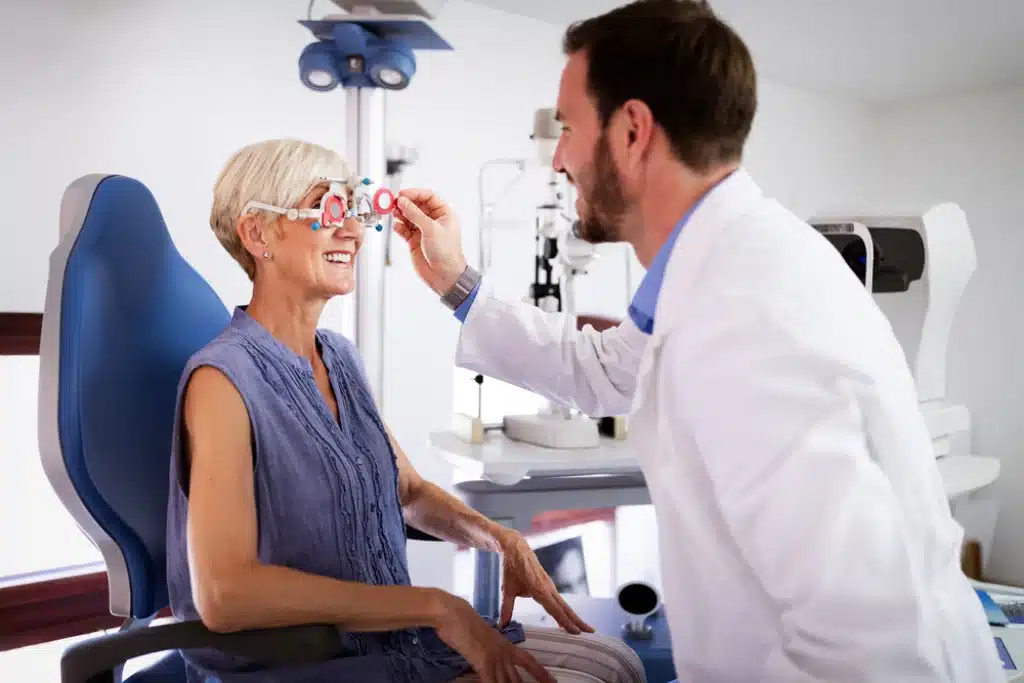Medically Reviewed by: Edward C. Wade, M.D., F.A.C.S.
Wearing Contacts After LASIK Eye Surgery
Why would someone need to wear contacts after LASIK? While LASIK has more than an overall 95% satisfaction rate, additional corrective vision options such as contacts or glasses are sometimes necessary. Learn about the reasons some LASIK patients may have additional corrective vision needs post-LASIK, including wearing contacts after LASIK.
Why would I need contacts after LASIK?
Most LASIK recipients have 20/20 vision (or better) after their procedure. However, the operation, like any other surgery, does come with some risks. For example, it is unlikely but possible for LASIK to cause irregular shaping of the corneal surface, otherwise known as astigmatism. Astigmatism can cause a lack of visual acuity and may necessitate other corrective options.
Additionally, pre-existing vision problems may make LASIK less effective. Presbyopia, the eye’s natural loss of focus as one ages, is one of these conditions. Even with the advanced techniques of Eye Center of Texas, you may still need one of the following additional corrective procedures to correct your vision.
- LASIK with Monovision entails correcting your dominant eye for distance vision and correcting the other for near vision. While this may not be for everyone, we will usually first recommend trying this technique with contact lenses before performing any surgery.
- Refractive Lens Exchange will replace your eye’s natural lens with an artificial lens which means you’ll require a less powerful prescription and improve your overall vision and range. The best part is, if you undergo this procedure you will never require cataract surgery!
If I wear contacts after LASIK, what kind of contacts will I need?
Because regular contact lenses are often found to be more difficult to fit on eyes post-surgery, many doctors recommend sclera contacts. These special contact lenses cover the entire cornea and help with dry eyes, a common issue in LASIK complications. Sclera contact lenses are a better alternative to glasses because they can solve problems caused by corneal aberrations; glasses correct essential refractive errors, such as nearsightedness and farsightedness.
Cost of LASIK
LASIK is becoming more and more affordable. While most insurance programs do not cover the procedure (it is viewed as being “cosmetic”) there are many other financing options to make LASIK affordable. We do not recommend trusting one of most important organs, your eyes, to a so-called “bargain” LASIK procedures. At Eye Center of Texas, LASIK is painless for both you and your wallet.
The Eye Center of Texas Difference
Eye Center of Texas provides the best in LASIK treatment with its revolutionary blade-free iLASIK procedure. Our surgeons provide the best in corrective vision surgery. With Dr. Mark Mayo, M.D. and Dr. Edward Wade, M.D., F.A.C.S., you can rest assured that the chance of needing other corrective vision options will be minimal.
If you are worried about complications in visual acuity arising from this treatment, schedule a consultation today by answering this brief questionnaire.
Financing Options Available
Apply today to find a financing option that meets your needs.
Our Locations
Houston/Bellaire
6565 W. Loop S., Suite 650Bellaire, TX 77401
Medical Office:
713-797-1010
Medical Fax:
713-357-7276
LASIK/Near Vision:
Office: 713-395-1515
Fax: 713-357-7278
Pasadena
4415 Crenshaw RoadPasadena, TX 77504
Medical Office:
281-977-8800
Medical Fax:
281-977-8877
Sugar Land
15200 S.W. Freeway, Suite 130Sugar Land, TX 77478
Medical Office:
281-277-1010
Medical Fax:
281-277-4504
Clear Lake
455 E. Medical Center Blvd., Suite 110Webster, TX 77598
Medical Office:
281-332-1397
Medical Fax:
281-282-9152
Katy
Greenhouse Medical Plaza2051 Greenhouse Road, Suite 110
Houston, TX 77084
Medical Office:
346-547-7070
Medical Fax:
281-214-2971
The Woodlands/Conroe
100 Medical Center Blvd., Suite 118Conroe, TX 77304
Medical Office:
936-647-1610
Medical Fax:
936-647-1620


